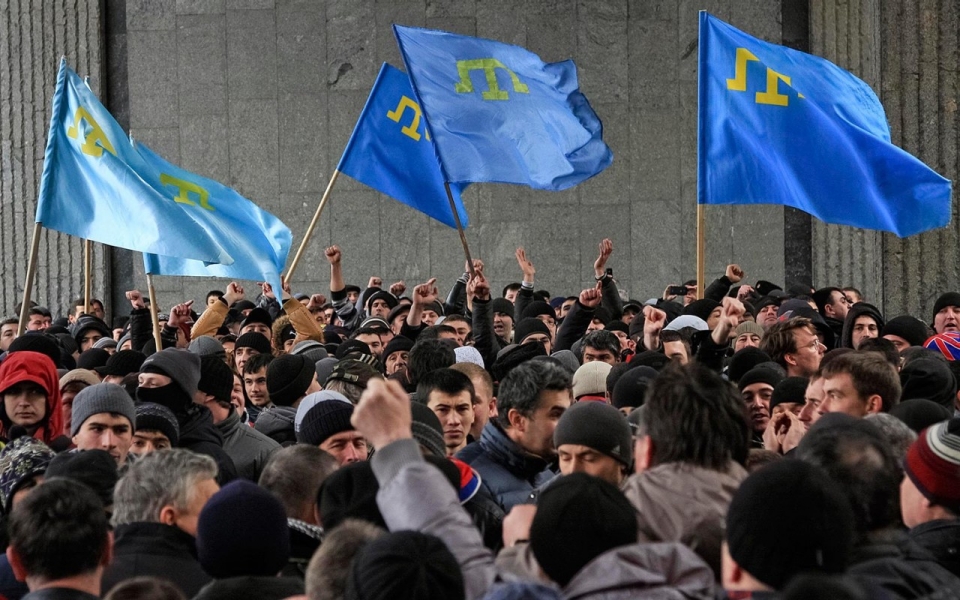
Annexation of Crimea Spurs Cooperation between Crimean Tatars and Circassians
Publication: Eurasia Daily Monitor Volume: 11 Issue: 200
By:

Having annexed the Crimean peninsula, Russia unintentionally accelerated the laying of groundwork for cooperation between the Crimean Tatars and the Circassians, according to Circassian activist Andzor Kabard. The Circassian Rights Initiative, a Turkish organization, took the first steps to establish closer contacts with the Crimean Tatars back in 2013. The Circassians asked Crimean Tatar organizations in Turkey and their organization in Ukraine, the Milli Mejlis, to cooperate to advance the interests of their respective peoples. Shortly after Russia’s formal annexation of Crimea this past spring, Circassian and Crimean Tatar activists in Turkey reached an agreement to lobby for their interests jointly (ekhokavkaza.com, November 5).
The historical trajectories of the Circassians and the Crimean Tatars are indeed strikingly similar. Both groups historically faced the consequences of the Russian Empire’s expansion and suffered serious losses at the hands of the advancing Russian armies. The Crimean Tatars turned into a minority in Crimea through a series of ethnic purges as well as the aggressive resettlement policies of the Russian Empire and, especially, of the Soviet Union. The Circassians were rendered a minority in their own homeland almost instantly after their final defeat in 1864 as the Russian Empire sought to assert control over the strategically important Black Sea coast. The Circassian population was deported en masse to the Ottoman Empire and Russian settlers quickly were dispatched to the northwestern Caucasus.
Perhaps one of the most important similarities between the Circassians and the Crimean Tatars is the fact that both their homelands are now part of the Russian Federation and their largest diasporas are in Turkey. Various estimates put the number of Circassians in Turkey at 6–8 million and the number of Crimean Tatars there at 4–6 million. The biggest difference between the two diasporas in Turkey seems to be that the Crimean Tatars are much more assimilated than the Circassians, probably because the Crimean Tatars speak a Turkic language similar to Turkish, while the Circassian language is quite different from Turkish. The issue of repatriation, therefore, is much less pronounced among the Tatars than among the Circassians (ekhokavkaza.com, November 5). The conflict between Russia and Ukraine, however, is likely to raise the national consciousness of the Crimean Tatars in Crimea and in the diaspora in Turkey.
Another factor likely to influence cooperation between the Crimean Tatars and the Circassians is Russia’s mounting pressure on the Crimean Tatars after the annexation of the peninsula. Searches, arrests and disappearances of Crimean Tatars are becoming the norm there, something that they did not experience under the Ukrainian government. According to Kabard, the Circassians lost about 2,000 people in the special operations waged by the Russian government in the North Caucasus over the past decade. According to the Circassian activist, Moscow is deliberately provoking a “jihad” in Crimea to crack down on the Crimean Tatars and to justify its human rights abuses.
Besides promoting links between the Crimean Tatars and the Tatars in Tatarstan, the Russian government is trying to use the connections between the peninsula and the North Caucasus in order to incorporate Crimea into the Russian Federation more quickly. Last August, a delegation of Crimeans that included Tatars toured the North Caucasian republics. In November, a delegation of North Caucasians visited Crimea. Even though the delegations were mostly made up of civil activists, the purpose of their visit was quite clear from their rhetoric. As Karachay activist Aliy Totorkulov declared during the visit to Crimea: “We spoke to various representatives of Crimean Tatar organizations and I can assert with certainty that the Crimean Tatars are glad to transition into the Russian Federation. They have realized that Russia wants only good for them” (kavpolit.com, November 5).
Totorkulov is one of the few people who say that Crimean Tatars are happy to have ended up in Russia. Even the Russian mainstream media was surprised by the crackdown on the Crimean Tatars’ Milli Mejlis organization in September (mk.ru, September 17). Crimean Tatar leaders like Mustafa Cemilev have essentially been expelled from their homeland. Harassment of the media considered disloyal to Russia also has become quite common practice (BBC News, September 24).
The Circassians and the Crimean Tatars may indeed find common ground for cooperation. However, Moscow also may use its network of government sponsored Circassian NGOs in the North Caucasus to promote submission to Russian rule among the Crimean Tatars. At this point, the Crimean Tatars are still attracting the attention of the world community because of the ongoing hostilities created by the Russia-Ukraine conflict. However, once world attention diminishes, Russia’s crackdown on Crimean Tatar activists may be even harsher than it is now. Cooperation between independent groups of activists may then become essential for all groups that are experiencing pressure from the government.




